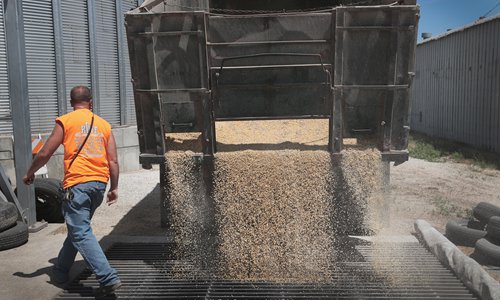US businesses, farmers welcome phase-one trade deal with China
Source:Xinhua Published: 2019/12/14 19:19:08

A man unloads soybeans at a Ruff Bros. Grain elevator on June 13, 2018 in Illinois, the US. Photo: VCG
US businesses and farmers have welcomed the phase-one economic and trade deal announced by the United States and China.
"This is an encouraging first phase that puts a floor under further deterioration of the bilateral relationship," US-China Business Council (USCBC) President Craig Allen said in a statement sent to Xinhua after Beijing announced a breakthrough in China-US trade talks.
Myron Brilliant, executive vice president and head of international affairs at the US Chamber of Commerce, called the move "a very positive development," saying that it "creates clarity for businesses and provides a lift for American consumers during the holiday season."
Noting that the news is "especially welcome," American Farm Bureau Federation President Zippy Duvall said that "reopening the door to trade with China and others is key to helping farmers and ranchers get back on their feet."
Tom Waters, a soybean and corn farmer, told Xinhua earlier that farmers are dependent on trade. "Getting these trade deals negotiated and in place can do nothing but help us, (and) help our price and our ability to feed the world, really."
Duvall said US farmers and ranchers are "eager to get back to business globally," and "progress restoring our ability to be competitive in China is a key component of that."
Rick Helfenbein, president and CEO of the American Apparel & Footwear Association, said the "tariff relief" included in the phase-one deal is "welcome" and "could be a sign that the end of the trade war may be in sight."
Echoing Helfenbein's comment, Gary Shapiro, president and CEO of the Consumer Technology Association, said the "partial tariff rollback" is welcome news, calling the phase-one deal "a significant step toward ending this costly trade war."
China and the United States have agreed on the wording of a phase-one economic and trade agreement based on the principles of equality and mutual respect, and the two sides have reached a consensus that the US side will fulfill its commitments to phase out additional tariffs on Chinese products, according to a statement issued by the Chinese side Friday.
The document includes nine chapters: a preface, intellectual property rights, technology transfer, food and agricultural products, financial services, exchange rate and transparency, trade expansion, bilateral assessment and dispute settlement, and final terms, the statement said.
Implementation of the agreement will help enhance intellectual property rights protection, improve the business environment, expand market access, better safeguard the legitimate rights and interests of all companies -- including foreign firms in China -- and protect the legitimate rights and interests of Chinese firms in their economic and trade activities with the United States.
"This is just the beginning," cautioned Allen, whose organization represents more than 200 US companies that do business in China.
The US business leader urged the two sides to build on the latest progress, developing "a new paradigm and economic relationship."
"The trade war is a self-inflicted wound that has caused a lot of pain for America. The sooner these tariffs are eliminated, the better," Helfenbein said, adding that "we won't stop pressing our case until this happens."
Helfenbein's sentiments are shared by many, including President of the Association of Equipment Manufacturers Dennis Slater, who noted that additional tariffs have "hurt equipment manufacturers, raised the costs of doing business and made it a lot harder for our industry to create more good-paying American jobs."
American consumers and businesses paid an additional 42 billion US dollars from February 2018 through October 2019 as a result of Washington-initiated trade disputes, US anti-tariff campaign group Tariffs Hurt the Heartland said earlier this week, citing data from the US Commerce Department.